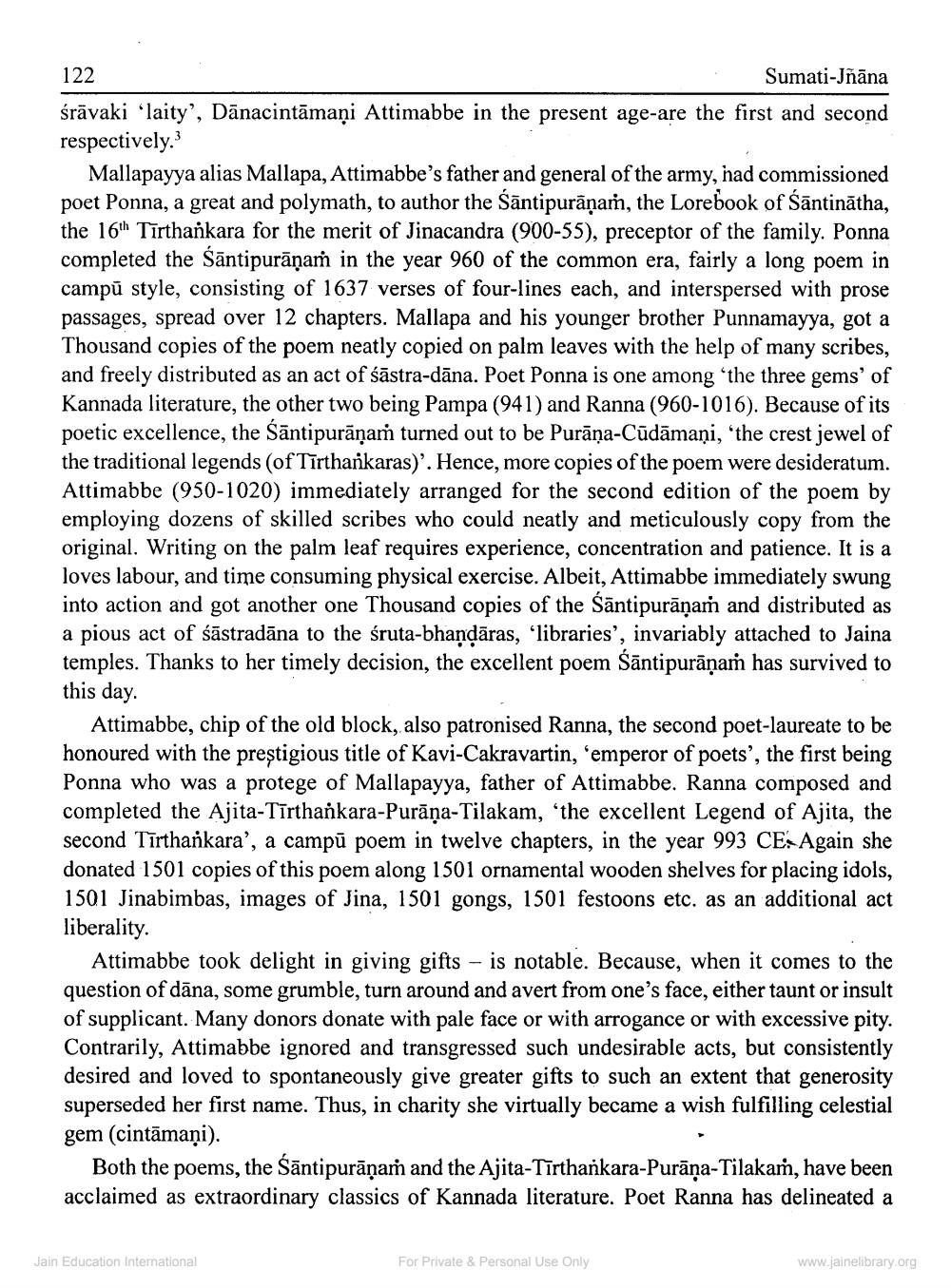________________
122
Sumati-Jñāna śrāvaki 'laity', Dānacintāmaņi Attimabbe in the present age-are the first and second respectively.
Mallapayya alias Mallapa, Attimabbe's father and general of the army, nad commissioned poet Ponna, a great and polymath, to author the Šāntipurāṇam, the Lorebook of Sāntinātha, the 16th Tīrthankara for the merit of Jinacandra (900-55), preceptor of the family. Ponna completed the Sāntipurāņaṁ in the year 960 of the common era, fairly a long poem in campū style, consisting of 1637 verses of four-lines each, and interspersed with prose passages, spread over 12 chapters. Mallapa and his younger brother Punnamayya, got a Thousand copies of the poem neatly copied on palm leaves with the help of many scribes, and freely distributed as an act of śāstra-dāna. Poet Ponna is one among the three gems' of Kannada literature, the other two being Pampa (941) and Ranna (960-1016). Because of its poetic excellence, the Sāntipurāņaṁ turned out to be Purāņa-Cūdāmaņi, 'the crest jewel of the traditional legends (of Tīrthankaras)'. Hence, more copies of the poem were desideratum. Attimabbe (950-1020) immediately arranged for the second edition of the poem by employing dozens of skilled scribes who could neatly and meticulously copy from the original. Writing on the palm leaf requires experience, concentration and patience. It is a loves labour, and time consuming physical exercise. Albeit, Attimabbe immediately swung into action and got another one Thousand copies of the Sāntipurāņam and distributed as a pious act of śāstradāna to the śruta-bhandāras, 'libraries', invariably attached to Jaina temples. Thanks to her timely decision, the excellent poem śāntipurāņaṁ has survived to this day.
Attimabbe, chip of the old block, also patronised Ranna, the second poet-laureate to be honoured with the prestigious title of Kavi-Cakravartin, emperor of poets', the first being Ponna who was a protege of Mallapayya, father of Attimabbe. Ranna composed and completed the Ajita-Tīrthankara-Purāņa-Tilakam, 'the excellent Legend of Ajita, the second Tīrthařkara', a campū poem in twelve chapters, in the year 993 CE- Again she donated 1501 copies of this poem along 1501 ornamental wooden shelves for placing idols, 1501 Jinabimbas, images of Jina, 1501 gongs, 1501 festoons etc. as an additional act liberality.
Attimabbe took delight in giving gifts - is notable. Because, when it comes to the question of dāna, some grumble, turn around and avert from one's face, either taunt or insult of supplicant. Many donors donate with pale face or with arrogance or with excessive pity. Contrarily, Attimabbe ignored and transgressed such undesirable acts, but consistently desired and loved to spontaneously give greater gifts to such an extent that generosity superseded her first name. Thus, in charity she virtually became a wish fulfilling celestial gem (cintāmaņi).
Both the poems, the śāntipurāņaṁ and the Ajita-Tīrthankara-Purāņa-Tilakaṁ, have been acclaimed as extraordinary classics of Kannada literature. Poet Ranna has delineated a
Jain Education International
For Private & Personal Use Only
www.jainelibrary.org




